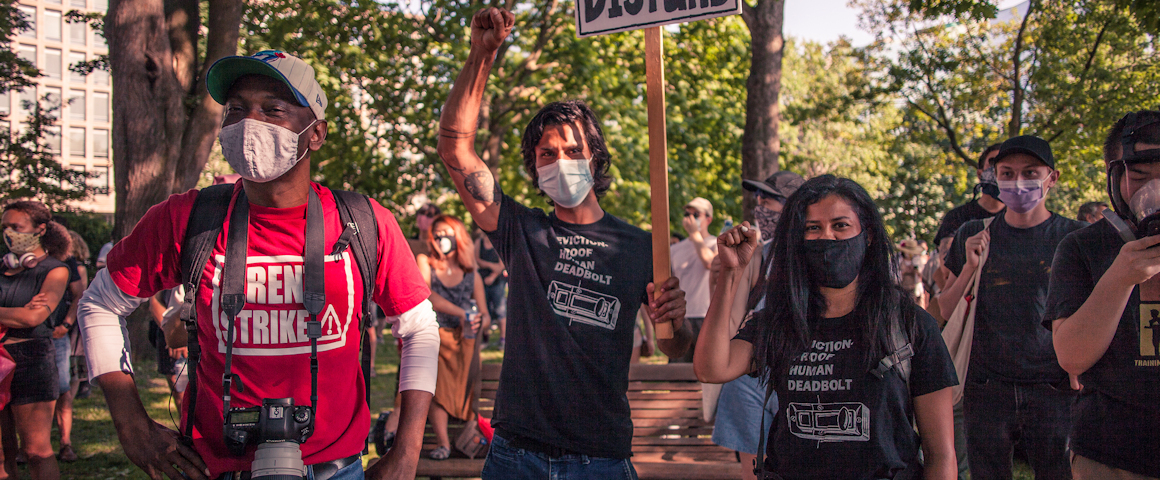[buzzsprout episode=’4972880′ player=’true’]
By Alykhan Pabani
United in action, Toronto’s tenants descended upon John Tory’s private residence on July 6, intending to deliver a mock eviction notice to the mayor. After years of casting futile ballots, petitioning groomed staffers and participating in patronizing consultations, disenfranchised neighbours have reached the conclusion that the only way to combat the deliberately engineered housing crisis is to take matters into their own hands.
Tenants did not kick down the mayor’s door with firearms on their hips. Tenants did not drag the mayor from his home in handcuffs, changing the locks behind him. Tenants did not throw the mayor into the streets of a city that views him as subhuman clutter obstructing the path of development.
Far from this, Tory cowered behind the Toronto police – the country’s most expensive gang of brutes – as they inflicted the violence they were established to impose. They twisted arms, yanked ankles, punched throats and maced eyes. “I have been around and am used to the fact that there are protests, including some directed at me, but I live in a condominium building and I am more concerned for my neighbours,” Tory snivelled the next day. Meanwhile, he has spent months looking the other way as a tidal wave of evictions approaches and threatens to swallow entire communities whole.
Some neighbours are more sensitive than others, it seems.
Predictably, Ontario’s premier Doug Ford reacted with similar dismay. “There’s an unwritten rule out there, and maybe they didn’t read the unwritten rule: you don’t go to someone’s house.” While tenants may not have read Ford’s ‘unwritten rules,’ they have certainly read his government’s written rules. Bill 184, dubbed ‘the eviction bill,’ is on the verge of becoming law and is a vicious assault on renters’ rights across the province. The dangers of this bill have been clearly articulated by tenants at previous demonstrations, including the one held on June 9 at Queen’s Park.
Many of those who have fallen behind on rent, due to loss of employment during the pandemic, have signed repayment agreements pushed by their landlords. The proposed new rules allow for an immediate eviction order should a tenant default on such an agreement. Circumstances may change, such as a second wave of COVID-19, whereby a tenant who was initially able to adhere to the terms of an agreement no longer can. Under the new rules, the tenant would lose their current ability to make this case in a formal hearing.
Worse, amendments introduced on July 2 seek to apply the law retroactively to March 17, when the state of emergency was declared and a temporary moratorium on residential evictions for non-payment of rent was ordered. This means that repayment agreements signed since the start of the lockdown will be admissible for legal consideration once the eviction moratorium is lifted, whereas the current rules render binding only those agreements which have been negotiated in mediation at the Landlord and Tenant Board (LTB). Since no standards have been set regarding what constitutes a repayment agreement or what a negotiation entails, landlords can pressure tenants into schemes with untenable terms – some are already doing this. This poses a disproportionate risk to tenants with language barriers or tenuous migration status, along with other vulnerable populations. Further, a tenant’s refusal to sign a repayment plan offered by the landlord could now count against the tenant at the LTB.
In an attempt to defend this move Ford stated, “Part of that bill, as you’ll see, is protecting tenants and going after landlords if they falsely kick someone out.” He gave the example of increased penalties for landlords who evict someone claiming family is moving into the unit, only to then rent the unit to someone else at a higher rate. New rules proposed by Bill 184 would entitle tenants to compensation worth up to 12 months of their former rent if they can prove that they were evicted under false pretences. While increased penalties may seem like a deterrent for such illicit behaviour, profit margins collected by the higher rate charged to new tenants quickly offset any penalties incurred. This results in landlords considering these rarely-awarded compensation orders as simply the cost of doing business.
As Bill 184 is widely expected to become law in the coming days, the Conservatives have proposed another law which would allow their majority government to retain emergency powers long after the state of emergency is over. At the same time, the Ontario Superior Court of Justice recently amended the order suspending residential evictions to read that said suspension will be in effect “until the end of the calendar month in which the state of emergency declared […] is terminated […]” These concurrent developments, taken together with repeated assertions around re-opening the economy, strongly suggest the Ford government intends to end the state of emergency before it is appropriate to do so and resume eviction proceedings shortly thereafter.
And why wouldn’t they?
Since the onset of the COVID-19 pandemic, we have seen countless instances of opportunism by the moneyed strata — enabled by their friends in power and enforcers in police uniform. Did anyone really expect giant corporate landlords to turn down the hundreds of millions in extra revenue that they stand to gain by terminating the rent-controlled tenancies of working class people, then jacking-up rents for those who replace them?
With a premier deploying wanton immiseration and a mayor unwilling to resist it, Toronto’s tenants have found themselves in the midst of a class war they can not afford to lose. As the very real likelihood of escalated physical confrontation looms right around the corner, those who are unaffected must honestly examine this privilege and choose a side.




